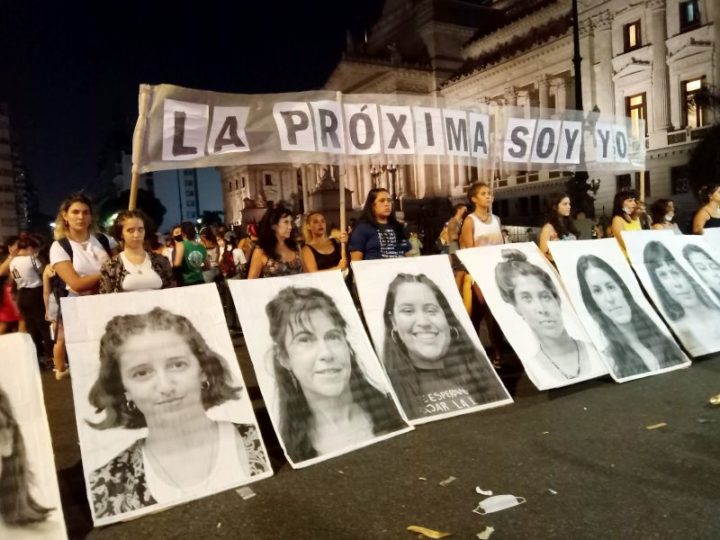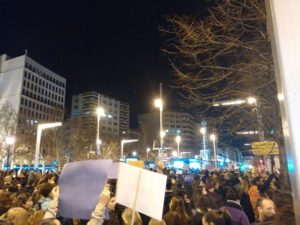Written by : Melissa Vida, Belen Febres-Cordero, Juliana Harsianti, Carlos E. Flores, Romina Navarro, Ardita Osmani, Andrea Mendez, Samea Shanori, Dahlia Kholaif, Sevgi Yagmur Bulut, Luis Carlos Diaz, Anette Eklund, Qurratulain (Annie) Zaman, Elisa Marvena, Janine Mendes-Franco
International Women’s Day celebrated on March 8 has become a day of marches for women’s rights and equality throughout the world. Although COVID-19 dampened participation in many countries, women still raised their voices on the streets on different continents, especially as the pandemic has worsened inequalities faced by women in terms of labor, household chores, and gender violence. In 2021, women and LGBTQ+ people marched against political and gender violence and for reproductive and sexual health. Here is a wrap-up from Latin America, the Middle East, Asia, and Europe on March 8, 2021, based on tweets and contributors’ photos.
Latin America and the Caribbean
In Trinidad and Tobago, 15 local civil society groups, which included feminist, human rights, LGBTQ+, and social justice organizations, conducted a “Walk-Out for Women” on March 8. Protestors demanded immediate actions against gender-based violence and commemorated recent femicide victims.
In Buenos Aires, as well as other cities in Argentina, women and trans people gathered to protest against gender violence and the state’s failure to prevent femicides, despite reports previously made by the victims.
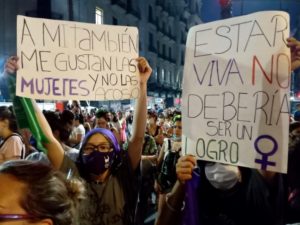
Left: ‘I, too, like women, but I don’t harass them.’ Right: ‘Being alive should not be an accomplishment.’ Photo by co-author Romina Navarro.
In El Salvador, women marched on March 7 for women’s rights and abortion rights. They performed the song and dance of the Chilean feminist song “The Rapist is You.”
Y la culpa no era mía
Ni dónde estaba
Ni cómo vestía pic.twitter.com/xq1zUd6tZS— Virginia ?️? (@huishte) March 7, 2021
“And the fault was not mine,
Nor where I was
Nor how I was dressed”
In Ecuador, Blanca Chancosa, a leader of the indigenous movement of Ecuador, performed an ancestral ceremony before the National Electoral Council of Ecuador in Quito. Amazonian women issued a collective statement and various communities and organizations marched in several cities of the country.
#CoberturaFeminista8M
Blanca Chancosa, lideresa del movimiento indígena del #Ecuador, realiza introducción a la ceremonia ancestral en las afueras del @cnegobec en #Quito.
¡Por los derechos a la tierra, la educación, la salud, a vivir, nadie se cansa! Es el grito de las mujeres pic.twitter.com/fdPfBiABZT— Wambra (@wambraEc) March 8, 2021
In Mexico, women turned the fences around the National Palace, placed days before International Women’s Day, into a monument to the victims of femicide throughout the country.
#AlMomento
Las consignas #MexicoFeminicida, #AbortoLegalYa y #UnVioladorNoSeráGobernador vistieron Palacio Nacional una noche antes del #8M. Las murallas para proteger los inmuebles fueron intervenidas con nombres de víctimas de feminicidio de todo el país.
Fotos: @Maria_Efemere pic.twitter.com/TsJvgXc5DB— Pie de Página (@PdPagina) March 8, 2021
#RightNow
The slogans #MexicoGuiltyofFemicide, #LegalAbortionNow and #ARapistWillNotBeGovernor dressed the National Palace the night before #8M. The walls that protect the buildings were plastered with names of femicide victims from all over the country.
Young feminists, unable to take to the streets on International Women’s Day, protested and staged a sit-in at the Central American University (UCA) in Nicaragua. They protested against gender violence and for the liberation of political prisoners.
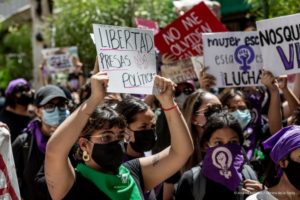
Photo by co-author Andrea Mendéz.
In Venezuela, women’s rights are deemed to have been left behind in the Bolivarian revolution, so several feminist groups on either side of the current authoritarian rule of Chavismo, have come together to demand action. Femicides and impunity around them have increased in the past year, along with poverty.
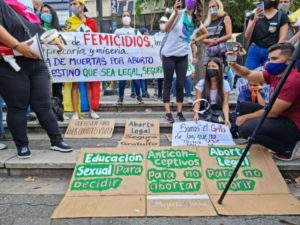
Photo by co-author Luis Carlos Díaz.
Middle East and Northern Africa
In Palestine, expressions of support, appreciation, and solidarity with women’s fight for liberation and their rights flooded social media platforms. Meanwhile, Israeli occupation forces raided an event organized by Palestinian women to celebrate identity and heritage on March 8, arresting two participants.
Israeli occupation forces raided an exhibition under the name of " Our Heritage is Our Identity " which organizered by Palestinian women in the #InternationalWomensDay pic.twitter.com/MwBOP3ONAk
— PALESTINE ONLINE ?? (@P_ONLINE9) March 8, 2021
In North and East Syria, precisely in the Hassakah province, Syrian Kurdish female fighters from the Women’s Protection Units (YPG) celebrated March 8 with song, traditional attire, and displays of physical strength and military training.
Women fighters from the YPJ celebrated International Women's Day on 8 March in the Al-Hasakah province of North and East #Syria.https://t.co/pElhxMYTst pic.twitter.com/tcPSUqm4Wm
— MedyaNews (@medyanews_) March 8, 2021
In Algeria, a rally of women protested the country’s Family Code, which is seen to treat women as second-class citizens, took place in Algiers to mark International Women’s Day.
قانون الأسرة à la poubelle
Rue Didouche Mourad
« Code de la famille à la poubelle »
"قانون الأسرة إلى المزبلة"#Alger pic.twitter.com/y8eo2JkA05— Khaled Drareni (@khaleddrareni) March 8, 2021
“The Family Code belongs in the trash” At Didouche Mourad street
Central and South Asia
In Pakistan, the Aurat March (Women’s March) took place in various cities of the country as the third wave of COVID-19 hit the country. The tweet below was filmed in Lahore, and the shirts depict the ages of rape victims as well as the relationship they had with their abuser. The Aurat March also presented a feminist health manifesto this year to raise awareness about women’s health.
Trigger Warning
Every year #auratmarch comes forward with great ideas to highlight women issues, pains, blood and loss… this display speaks of all that babies, girls women have gone through…. #WhyIMarch #WomensDay @AuratMarch #Lahore pic.twitter.com/2fFKwMIgDX— Umaima Ahmed (@UmaimaBlogger) March 8, 2021
In Kabul, Afghanistan, Rada Akbar, an Afghan artist and activist, began her 2021 “Abarzanan” exhibition to celebrate the achievements of Afghan women by giving a tribute to those lost to violence in Afghanistan. Also, Afghans gathered for a street art exhibition at Rebel Art Cafe on March 8.
When we started @abarzanan 3 years ago I had never imagined we would go through this, holding the exhibition for the deceased but I think everything impossible is possible here; in the absence of justice, in the absence of peace. #IWD2021 pic.twitter.com/AuSKfMCznf
— Rada Akbar (@RADAAKBAR) March 8, 2021
In Kyrgyzstan, the gathering paid tribute to women who have fought for gender equality.
Это было невероятно. Вот как прошли марши в Бишкеке и Оше, почитайте: https://t.co/EjK4JcEbtz
Фото: @LexTitova / @kloopnews#InternationalWomensDay pic.twitter.com/XwpiC9IHzg
— Bektour Iskender (@bektour) March 8, 2021
It was unbelievable. Here’s how the marches in Bishkek and Osh went, read it here
Photo: @LexTitova
Southeast Asia
As Myanmar goes through a military coup, women used variations of the hashtag #htamineResistance (SarongResistance), alluding to the fact that the civil disobedience movement protestors hang women’s sarongs to block the military, as it is believed that men would lose their spirituality if they touch the sarong. Women have also been on the frontlines of the protests.
“HtaMain” Resistance, Yangon and Mandalay March 4, People are hanging women sarongs at the front lines of strikes to delay and deter the military junta security forces from entering. It is a wide spread superstition that walking under the HtaMain will loose men’s power/influence. pic.twitter.com/RngTSdj8KO
— Than Htaik Aung (@ThanHtaikAung20) March 4, 2021
In Jakarta, Indonesia, women and non-binary people gathered under the rain to head towards the Presidential Palace. Yet, they could not reach their destination as the police blocked the main road and people got arrested.
Selamat Hari Perempuan Internatsional untuk para puan & trans-nonbinary seperjuangan✊?✊?#InternationalWomensDay pic.twitter.com/aXCPJt9JCa
— Cabut Omnibus Law! (@Lini_ZQ) March 8, 2021
Happy International Women’s Day to the ladies & trans-nonbinary alike ✊?✊?
Meanwhile, in Jayapura, West Papua, indigenous women initiated a rally. This march was also stopped by the police.
8/3/21 Jayapura, West Papua
A peaceful #IWD2021  rally is blocked by police, 9 Indigenous people were briefly arrested. pic.twitter.com/pzyagluKbz
— Veronica Koman (@VeronicaKoman) March 8, 2021
In Istanbul, Turkey, thousands of women came together for the traditional March 8 Feminist Night Walk. They chanted, “We are not silent, we are not afraid, we do not obey,” and demanded the implementation of the Istanbul Convention. The next day, 18 women were taken from their homes at night by the police and detained for participating in the march along with anti-presidential slogans; they have later been released on bail.
Karaköy’e yürüyüşümüz başladı. Gelmeyen kalmasın! #8MarttaTaksimdeyim pic.twitter.com/pG5XCPkZ7n
— 8 Mart Feminist Gece Yürüyüşü (@8MartYuruyus) March 8, 2021
In Italy, feminists and transfeminists organized strikes in the main cities’ squares. They organized pickets, read poems, sang songs, danced flash mobs, and put up banners.
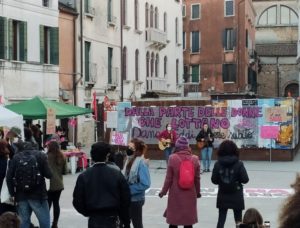
Photo by co-author Ardita Osmani, taken in Venice, Italy.
In Zaragoza, Spain, the demonstration was made under strict social distancing rules. In 2020, March 8 demonstrations were severely criticized for transmitting COVID-19, and demonstrations were banned in Madrid in 2021.
Demonstration at Women’s Day in Zaragoza / This file is licensed under the Creative Commons Attribution-Share Alike 4.0 International
In Paris, France, there were no physical demonstrations. However, a giant artwork portraying a clitoris was put in front of the Eiffel tower by feminist activists, entitled “Gang du Clito” (clitoris gang).
On a installé un clitoris géant face à la Tour Eiffel, avec @gangduclito ! #JourneeDesDroitsDesFemmes pic.twitter.com/Zo0wtprmdk
— Simone Media (@simonemediafr) March 8, 2021
We put up a huge clitories in front of the Eiffel Tower with @gangduclito! #InternationalWomensRightsDay


